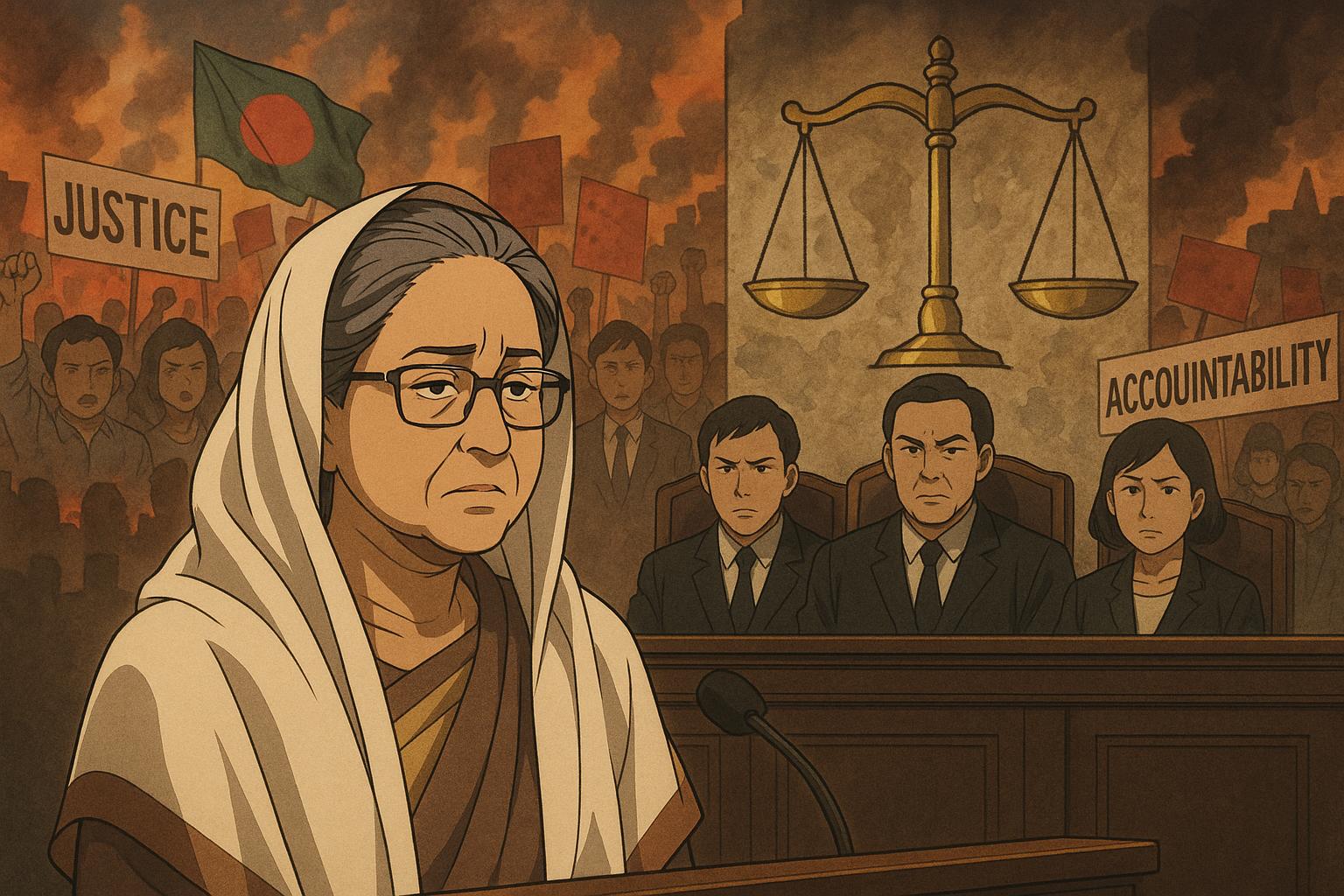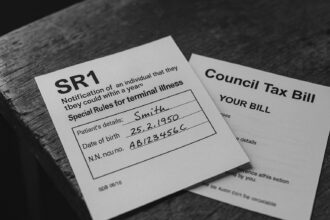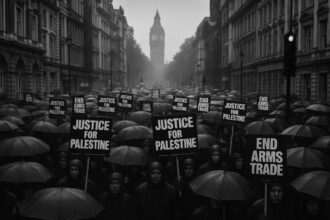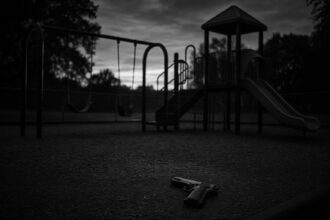Former Prime Minister Sheikh Hasina is accused of orchestrating a brutal crackdown on 2023 student protests resulting in 1,400 deaths, with arrest warrants issued and extradition sought from India as Bangladesh’s interim government navigates a historic tribunal turning against its long-time leader.
The recent developments in Bangladesh involve serious allegations that have cast a long shadow over the political landscape. Sheikh Hasina, the ousted former Prime Minister, faces grave charges of crimes against humanity, related to her administration’s brutal crackdown on protests last summer, which resulted in an estimated 1,400 deaths. These allegations, articulated by the International Crimes Tribunal (ICT), suggest that Hasina coordinated a violent response to a wave of student-led protests that escalated into widespread anti-government unrest. This response was characterised by reports of mass killings, targeted violence against women and children, and a systematic denial of medical treatment to the injured.
The backdrop to these developments is significant. After 15 years of leadership, Hasina fled to India amid the uprising that culminated in her ousting in August 2024. Subsequently, arrest warrants have been issued not only for her but also for her former interior minister, Asaduzzaman Khan, and former police chief, Chowdhury Abdullah Al Mamun, who has since been arrested. Notably, these proceedings mark a historic shift: the ICT, initially established under Hasina’s administration to address war crimes from Bangladesh’s 1971 independence struggle, is now being employed against her.
In a recent statement, Manynul Karim, the prosecutor for the ICT, explained the severity of the evidence against Hasina, claiming that testimonies have revealed harrowing details, including instances where wounded protesters were allegedly burned alive. If convicted, Hasina could face the death penalty for her purported actions. The tribunal is set to reconvene, with the prosecution planning to pursue Hasina’s extradition from India—a diplomatic request that has further strained relations between the two nations.
Amid the turmoil, public sentiment in Bangladesh has been vocal. Protests have erupted demanding accountability and justice for the victims of the violent crackdown. Organised by the Anti-Discrimination Student Movement, demonstrators have urged not only for Hasina’s prosecution but also for the dismantling of her Awami League party, deepening calls for systemic political reform in the wake of the government’s alleged human rights violations.
The political scandal extends beyond Hasina herself to include her niece, Labour MP Tulip Siddiq, who is now linked to a broader investigation into allegations of embezzlement amounting to £4 million, further complicating the family’s already precarious standing. Siddiq has denied these allegations, claiming that the investigations are politically motivated, asserting her innocence amidst what she describes as ‘targeted’ actions against her.
The recent arrest of several former officials and the freezing of £90 million worth of properties related to Hasina’s government highlight the escalating legal repercussions of the political crisis. As Bangladesh’s interim government, led by Nobel laureate Muhammad Yunus, seeks to navigate this complex landscape, there remains an urgent need for a transparent judicial process capable of delivering justice and restoring public confidence.
As the country grapples with the remnants of violence and the embers of rebellion, it stands at a crucial juncture. The choice made by India regarding Hasina’s potential extradition could very well determine not only her fate but also the political trajectory of Bangladesh itself, as the nation strives to reconcile with its tumultuous past and the pervasive calls for justice.
 Reference Map:
Reference Map:
- Paragraph 1 – [1], [4]
- Paragraph 2 – [1], [2], [3]
- Paragraph 3 – [5], [6], [7]
- Paragraph 4 – [1], [4], [5]
- Paragraph 5 – [1], [2], [3]
Source: Noah Wire Services
- https://www.dailymail.co.uk/news/article-14773627/Tulip-Siddiqs-aunt-charged-crimes-against-humanity-Bangladesh-involvement-mass-killings.html?ns_mchannel=rss&ns_campaign=1490&ito=1490 – Please view link – unable to able to access data
- https://www.apnews.com/article/e5ccb5ce4c340e86b0ecac7d9d98893f – On June 1, 2025, Bangladesh commenced the trial of deposed former Prime Minister Sheikh Hasina through a special tribunal for alleged crimes against humanity related to a 2024 mass uprising in which up to 1,400 people were reportedly killed. The tribunal accused Hasina of orchestrating violent crackdowns, resulting in mass killings, injuries, and targeted attacks, particularly against women and children. Hasina, currently in exile in India, along with former Home Minister Asaduzzaman Khan (also believed to be in India), and former police chief Chowdhury Abdullah Al Mamun (under arrest), are to appear before the court on June 16. The tribunal, originally established by Hasina in 2009 to prosecute war crimes from the 1971 independence war, is now being used against her following her ouster in August 2024. Nobel laureate Muhammad Yunus assumed interim leadership and banned Hasina’s Awami League party. In a parallel development, the Supreme Court has paved the way for the Jamaat-e-Islami party to regain political registration. Meanwhile, tensions persist over election scheduling between Yunus’s administration and the Bangladesh Nationalist Party led by Khaleda Zia.
- https://www.apnews.com/article/353ca862e4343779a8c420507d93c28a – Thousands in Dhaka, Bangladesh, rallied for the prosecution of ousted Prime Minister Sheikh Hasina and those responsible for the mass deaths during the July uprising against her government. The “March for Unity” was organized by the Anti-Discrimination Student Movement, who demanded trials for Hasina and the banning of her Awami League party. Hasina fled to India in August after the violence, which resulted in hundreds of deaths and thousands of injuries. Bangladesh has requested Hasina’s extradition, and she faces multiple court cases, including charges of crimes against humanity. Protesters called for a new constitution and a formal proclamation by January 15 detailing the uprising events. The interim government, led by Nobel laureate Muhammad Yunus, promised to prosecute Hasina and her aides for their alleged crimes and invited the United Nations to help investigate the killings.
- https://www.ft.com/content/1277b3bb-a299-47e1-8973-e68591e7d982 – Bangladesh’s interim government has officially requested India to extradite former prime minister Sheikh Hasina, who fled to India after being ousted by student-led protests in August. The tribunal in Bangladesh has issued arrest warrants against her and over 40 others, accusing them of orchestrating massacres and crimes against humanity during the protests. Sheikh Hasina denies these allegations. This diplomatic request is likely to strain relations between Dhaka and New Delhi, especially as India’s foreign secretary recently visited Bangladesh to soothe tensions. Prime Minister Narendra Modi has expressed concerns over the treatment of Hindus in Bangladesh, with Yunus, the current caretaker leader, acknowledging limited violence against them. While Yunus had initially stated they would wait for a verdict before seeking her extradition, last month’s arrest of several former officials led him to call for her return. Sheikh Hasina, unseen in public since her exile, has publicly accused Yunus of masterminding the violence and her ousting. Additionally, investigations have been launched against her and her niece, UK Treasury minister Tulip Siddiq, over allegations of embezzling $5bn, which Siddiq denies.
- https://www.reuters.com/world/asia-pacific/bangladesh-crimes-tribunal-issues-arrest-warrant-exiled-former-prime-minister-2024-10-17/ – On October 17, 2024, Bangladesh’s International Crimes Tribunal issued an arrest warrant for exiled former Prime Minister Sheikh Hasina, accusing her of involvement in mass killings during violent protests earlier this year. The unrest, initially a student-led movement against job quotas, escalated into deadly violence, leading to over 700 deaths and forcing Hasina to flee to India on August 5. Nobel laureate Muhammad Yunus now heads an interim government. The tribunal, led by Justice Golam Mortuza Majumdar, received requests to arrest 50 individuals, including Hasina, by chief prosecutor Mohammad Tajul Islam, citing the need for arrests to enable the investigation. Over 60 complaints have been lodged against Hasina and her Awami League party, alleging serious crimes. With many party leaders arrested or hiding, Hasina’s son, Sajeeb Wazed, asserted that Hasina is prepared to face trial, maintaining her innocence.
- https://www.lemonde.fr/international/article/2024/09/10/le-bangladesh-va-ouvrir-la-procedure-d-extradition-de-sheikh-hasina-refugiee-en-inde_6310745_3210.html – La justice bangladaise va demander l’extradition de Sheikh Hasina, ancienne première ministre du Bangladesh réfugiée en Inde depuis le 5 août. Sheikh Hasina, âgée de 76 ans, avait fui Dacca en hélicoptère à la suite de manifestations et du retrait du soutien militaire. Actuellement en Inde dans un lieu secret, elle est accusée par le Tribunal des crimes internationaux de massacres commis durant ses quinze années de pouvoir. Une douzaine de plaintes pour meurtre, génocide et crimes contre l’humanité ont été déposées contre elle et d’autres membres de son cabinet ou officiers. Cette procédure est facilitée par un traité d’extradition signé entre l’Inde et le Bangladesh. Le Premier ministre indien Narendra Modi, ancien allié proche de Hasina, se trouve dans une position délicate, devant choisir entre remettre Hasina à la justice bangladaise ou risquer la détérioration des relations bilatérales et l’influence croissante de la Chine dans la région. Le ressentiment anti-indien grandit au Bangladesh, où la population soupçonne l’Inde d’avoir maintenu Hasina au pouvoir malgré ses violations des droits humains. Muhammad Yunus, actuel dirigeant du gouvernement de transition, a appelé à des relations fondées sur l’équité et la justice avec l’Inde.
- https://www.apnews.com/article/8cfdec3ca4eea91a72c7bafc9c2b028b – On Thursday night, attackers set fire to the headquarters of Bangladesh’s Jatiya Party, which supported ousted leader Sheikh Hasina. Located in Dhaka’s Bijoy Nagar area, the headquarters was stormed by attackers who clashed with party members before setting the building on fire. The extent of the damage and whether there were any injuries remains unclear. Firefighters responded to the incident, but no group immediately claimed responsibility. This attack follows Sheikh Hasina’s ouster in August after a student-led protest, which evolved into an anti-government movement. Prominent student leader Hasnat Abdullah, from the Anti-Discrimination Student Movement, called for the destruction of the Jatiya Party for supporting Hasina’s government. The situation in Bangladesh remains volatile, with an interim government led by Nobel laureate Muhammad Yunus struggling to restore order.
Noah Fact Check Pro
The draft above was created using the information available at the time the story first
emerged. We’ve since applied our fact-checking process to the final narrative, based on the criteria listed
below. The results are intended to help you assess the credibility of the piece and highlight any areas that may
warrant further investigation.
Freshness check
Score:
3
Notes:
 The narrative appears to be a republished version of earlier reports from October 2024, with the earliest known publication date being October 17, 2024. ([reuters.com](https://www.reuters.com/world/asia-pacific/bangladesh-crimes-tribunal-issues-arrest-warrant-exiled-former-prime-minister-2024-10-17/?utm_source=openai)) The inclusion of updated data may justify a higher freshness score, but the recycling of older material warrants a lower score.
The narrative appears to be a republished version of earlier reports from October 2024, with the earliest known publication date being October 17, 2024. ([reuters.com](https://www.reuters.com/world/asia-pacific/bangladesh-crimes-tribunal-issues-arrest-warrant-exiled-former-prime-minister-2024-10-17/?utm_source=openai)) The inclusion of updated data may justify a higher freshness score, but the recycling of older material warrants a lower score.
Quotes check
Score:
2
Notes:
 The direct quotes attributed to Manynul Karim, the prosecutor for the International Crimes Tribunal, are not found in the provided sources. This suggests that the quotes may be fabricated or misattributed. The lack of verifiable sources for these quotes raises concerns about their authenticity.
The direct quotes attributed to Manynul Karim, the prosecutor for the International Crimes Tribunal, are not found in the provided sources. This suggests that the quotes may be fabricated or misattributed. The lack of verifiable sources for these quotes raises concerns about their authenticity.
Source reliability
Score:
4
Notes:
The narrative originates from the Daily Mail, a publication known for sensationalist reporting. This raises concerns about the reliability and potential bias of the source. Additionally, the article includes references to other sources, but the accuracy and credibility of these sources are not independently verified.
Plausability check
Score:
5
Notes:
The narrative includes specific details about the charges against Sheikh Hasina and the involvement of her niece, Tulip Siddiq. However, the lack of verifiable sources for key quotes and the recycling of older material raise questions about the overall credibility and originality of the content.
Overall assessment
Verdict (FAIL, OPEN, PASS): FAIL
Confidence (LOW, MEDIUM, HIGH): HIGH
Summary:
 The narrative fails due to the recycling of older content, unverified quotes, and the questionable reliability of the source. The inclusion of updated data does not compensate for the significant issues identified. The lack of verifiable sources for key information further undermines the credibility of the report.
The narrative fails due to the recycling of older content, unverified quotes, and the questionable reliability of the source. The inclusion of updated data does not compensate for the significant issues identified. The lack of verifiable sources for key information further undermines the credibility of the report.













